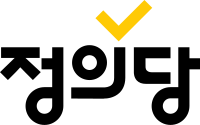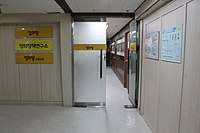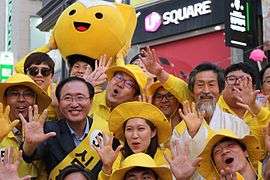Justice Party (South Korea)
Justice Party 정의당 Jeonguidang | |
|---|---|
 | |
| Leader | Lee Jeong-mi |
| Floor Leader | Yun So-ha (Acting) |
| Secretary General | Shin Jang-sik |
| Founded | 21 October 2012 |
| Merger of |
People's Conference Labor Politics Coalition Elements of the Labor Party |
| Split from | Unified Progressive Party |
| Headquarters | 7, Gukhoe-daero 70-gil, Yeongdeungpo District, Seoul |
| Youth wing | Youth Justice Party |
| Membership (2017) | 35,000[1] |
| Ideology |
Reformism[2] Progressivism[2] |
| Political position | Centre-left[3][4][5] to left-wing[6][7] |
| International affiliation | Progressive Alliance (Observer)[8][9] |
| Parliamentary group | None |
| Colours | Yellow |
| Slogan | Labor's Hope, Citizen's Dream (노동의 희망, 시민의 꿈, Nodongi himang, simini kkum) |
| Seats in the National Assembly |
5 / 300 |
| Metropolitan mayor and Gubernatorial |
0 / 17 |
| Municipal Mayors |
0 / 226 |
| Seats within local government |
37 / 3,750 |
| Website | |
| www.justice21.org | |
| Justice Party | |
| Hangul | 정의당 |
|---|---|
| Hanja | 正義黨 |
| Revised Romanization | Jeonguidang |
| McCune–Reischauer | Chŏngŭidang |

The Justice Party (정의당) is a political party in South Korea. It was founded on 21 October 2012, a division from the Unified Progressive Party.
History
The "Progressive Justice Party" changed its name to the "Justice Party" at the 2nd party congress on 16 July 2013.[10] At the 4th party congress on 22 November 2015, the party officially merged with the extra-parliamentary groups: Preparatory Committee for the People's Party (2015), Solidarity for Labor Politics, and Jinbo Plus, which was composed of members defected from the Labor Party, after motions to merge the party with the Justice Party failed.
After the merger, Na Gyung-che, leader of the Jinbo Plus, and Kim Se-kyun, leader of Preparatory Committee for the People's Party, were elevated to co-leadership roles, while Sim Sang-jung remained as a standing party leader.[11] Kim Se-kyun stepped down from the co-leadership role in September 2016.
In the legislative election held in April 2016, the party increased its seat total by one with the election of Roh Hoe-chan to the Seongsan constituency in the city of Changwon. The party polled 7.2% in the party list ballot, returning a total of six legislators to the National Assembly.
In the 2017 election, Sim Sang-jung ran as the party's nominee after winning the party primary. Sim was endorsed by Korean Confederation of Trade Unions (KCTU) and ran a campaign focused on labor[12] and social issues. Sim received media attention for being the only candidate arguing in favor of marriage equality during the debate.[13] Sim won 6.2% of the vote, making her the most successful left-wing presidential candidate since the democratization of the country in 1987.
On July 2017, with Sim's two-year leadership term coming to an end, the party elected sitting National Assembly member Lee Jeong-mi as the new leader over Park Won-suk by 56 to 44.[14]
On 31 March 2018, the party confirmed its decision to form a parliamentary group with Party for Democracy and Peace, under the name of Members group of Peace and Justice. The parliamentary group will be officially registered on April 2nd. [15] The incumbent floor leader of the party, Roh Hoe-chan was chosen to head the parliamentary group in the National Assembly.
Ideology
Economy
The party calls for structural change of the Korean economy through the radical change to the current Chaebol dominated economic system, democratic control of the capitalistic excess through the implementation of economic democracy and public ownership of basic utilities.[2] Pursuing alternative form of economic system in which basic conditions for people's life is provided for everyone, equally. Where public or market economy is inefficient, the party will advocate social economy, including cooperatives and further increasing the role of social economy to the ones traditionally held by the market.[2] It also calls for protection and increase of the labor rights and promote unionization in the workplace, so to equalize the power balance between the capital and the workers.[2] The party advocates creation of welfare state, drastically increasing the public sector, providing universal welfare service for childcare, education, employment, housing, healthcare, and post-retirement life. The party will fund these programs through increased taxation based on the redistributive tax policy.[2]
Environment
The party calls for an end to the unrestricted development, pursuing sustainable development. It is also in favor of the animal welfare. It also argues in favor of developing renewable energy, with sights on doing away with oil and coal altogether. The party is against nuclear energy as an alternative, and advocates closing down old nuclear power plants and ceasing further construction of the plants.[2]
Social issues
The party calls for the eradication of all forms of discrimination, advocating increased participation of the minorities in the political sphere. It further advocates pursuing gender equality in the workplaces and preserving women's right to choose. The party favors increased disability rights and protecting migrants from human rights violation and economic discrimination. The party stands strongly against any form of oppression due to one's sexuality or gender identity. It calls for legislation relating to hate crime to protect the human rights of the minority. It also acknowledges diverse family structures without any discrimination.[2]
Foreign relations
In the midst of the conflict between US and China for the hegemony and Japanese attempt at rearmament, the party believes peace in the Korean peninsula is a paramount issue. The party rejects any form of hegemony from both sides, and refuse to take the side on the issue. The party aims to sign the peace treaty with the North, putting an end to the Korean War once and for all. While the party believes unification between the North and the South should be a desirable goal, it doesn't consider unification through war or collapse of the North Korean regime as a viable solution. Unification should be pursued based on mutual respect between respective countries and further increasing exchange and cooperation.[2]
Leadership

Leaders of the Justice Party
- Roh Hoe-chan, Jo Jun-ho (co-serving; 21 October 2012 – 21 July 2013)
- Cheon Ho-sun (21 July 2013 – 18 July 2015)
- Sim Sang-jung (18 July 2015 – 22 November 2015)
- Sim Sang-jung (standing)
- Kim Se-kyun (co-serving; 22 November 2015 – 30 September 2016)
- Na Gyung-che (co-serving; 22 November 2015 – 11 July 2017)
- Lee Jeong-mi (11 July 2017 – present)
Leaders in the National Assembly
- Kang Dong-won (21 October 2012 – 2 May 2013)
- Sim Sang-jung (2 May 2013 – 9 June 2015)
- Jeong Jin-hoo (9 June 2015 – 3 May 2016)
- Roh Hoe-chan (3 May 2016 – 23 July 2018)
- Yun So-ha (Acting) (23 July – present)
Election results
Presidential elections
| Election | Candidate | Total votes | Share of votes | Outcome |
|---|---|---|---|---|
| 2017 | Sim Sang-jung | 2,017,458 | 6.2% | Lost |
Legislative elections
| Election | Total seats won | Total votes | Share of votes | Outcome of election | Election leader |
|---|---|---|---|---|---|
| 2016 | 6 / 300 |
1,719,891 / 23,760,977 |
7.2% | Sim Sang-jung |
Local elections
| Election | Metropolitan mayor/Governor | Provincial legislature | Municipal mayor | Municipal legislature | Election leader |
|---|---|---|---|---|---|
| 2014 | 0 / 17 |
0 / 789 |
0 / 226 |
11 / 2,898 |
Cheon Ho-sun |
| 2018 | 0 / 17 |
11 / 789 |
0 / 226 |
26 / 2,898 |
Lee Jeong-mi |
See also
References
- ↑ "정당후원금, 3만 당원 정의당이 100만 민주당 앞섰다". Kukminilbo. 2017-12-31.
- 1 2 3 4 5 6 7 8 9 "정의당 강령" [Justice Party platform]. Justice Party. 2013-06-23. Retrieved 2016-02-09.
- ↑ Lansford, Tom (25 April 2017). Political Handbook of the World 2016-2017. CQ Press. p. 827. ISBN 9781506327150.
- ↑ Petricic, Saša (24 September 2017). "The 'frightened dog' and the 'rocket man': Trump-Kim war of words causes rising tensions". CBC News. CBC. Retrieved 27 January 2018.
- ↑ "South Korea: Economic and Political Overview". Nordea Trade. Nordea. 2017. Retrieved 27 January 2018.
- ↑ "Moon Jae-in's support rises 40%, while Ahn Cheol-soo's falls to 24%". Hankyoreh. Retrieved 2 May 2017.
- ↑ "Digital brigade helped send South Korea's Moon to the top". Nikkei Asian Review. Nikkei. 21 May 2017. Retrieved 27 January 2018.
- ↑ "List of Participants - Denpasar Seminar, 19-20 September 2016 - Progressive Alliance". 22 September 2016.
- ↑ "List of Participants - Conference in Ulaanbaatar, 25–26 May 2017 - Progressive Alliance". 18 May 2017.
- ↑ "제2차 당대회(혁신당대회) 회의자료 및 결과". Justice Party (in Korean).
- ↑ "진보 4개 정당·단체 통합 '정의당' 출범". Kyunghyang Shinmun (in Korean). 22 November 2015. Retrieved 16 April 2016.
- ↑ "심상정, '개혁ㆍ노동 대통령' 강조". Naver. 해럴드경제. Retrieved 15 September 2017.
- ↑ "심상정이 꼽은 기억에 남는 순간 'TV토론 성소수자 1분 찬스 발언'". Naver. Kyunghyang Sinmun. Retrieved 15 September 2017.
- ↑ "이정미 정의당 당대표 당선... '포스트 노-심 시대' 시작". Naver. OhMyNews. Retrieved 15 September 2017.
- ↑ "정의당, 오늘 사상 첫 국회교섭단체 된다…전국위 최종 승인". News1. Naver. Retrieved 31 March 2018.